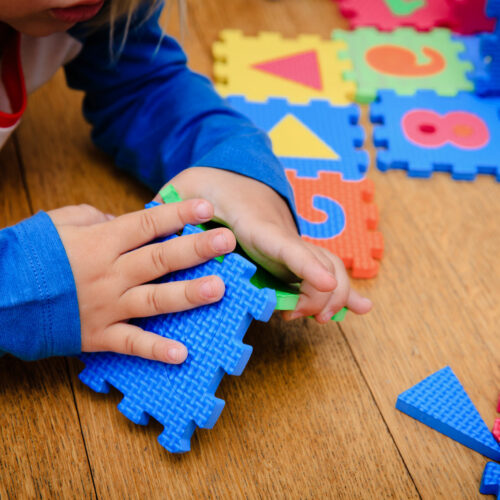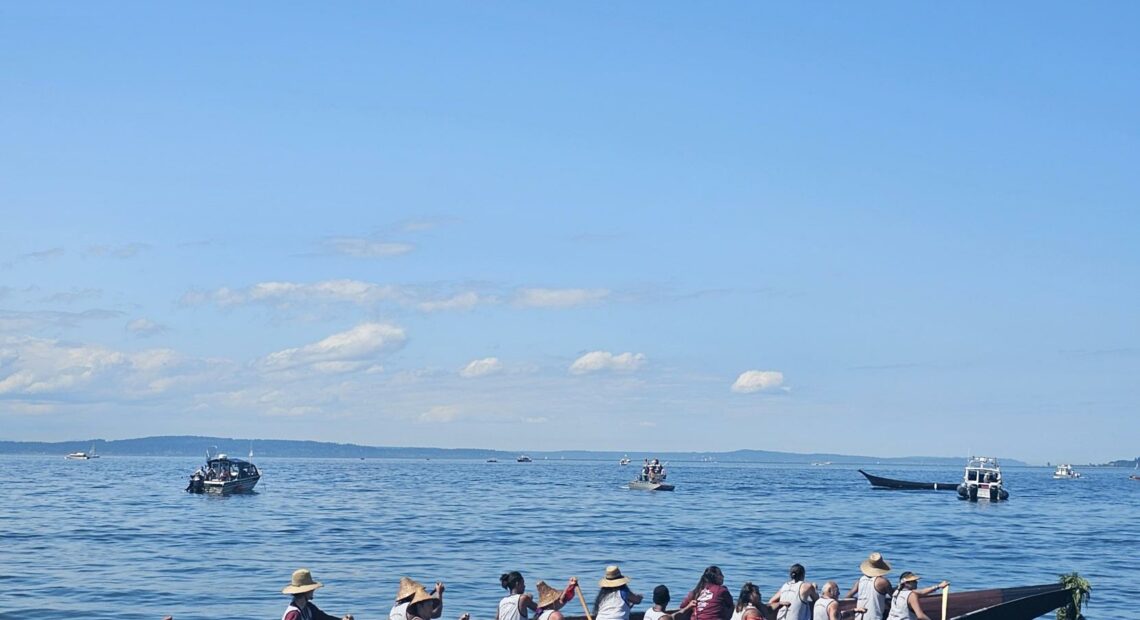
Paddle to Muckleshoot: An epic canoe journey returns
Read and Listen
A breeze, clouds and a humidity that hadn’t been in West Seattle for days, filled the air on the morning of July 30, as visitors to Alki Beach found seats or meandered down to the shore, waiting.
A little after 11 a.m., as the sun began to break through the gray, the tip of a canoe and its passengers’ paddles could just be seen cutting across the water, the first canoe to arrive of what would be over 100 canoes traveling to the homelands of the Muckleshoot People.
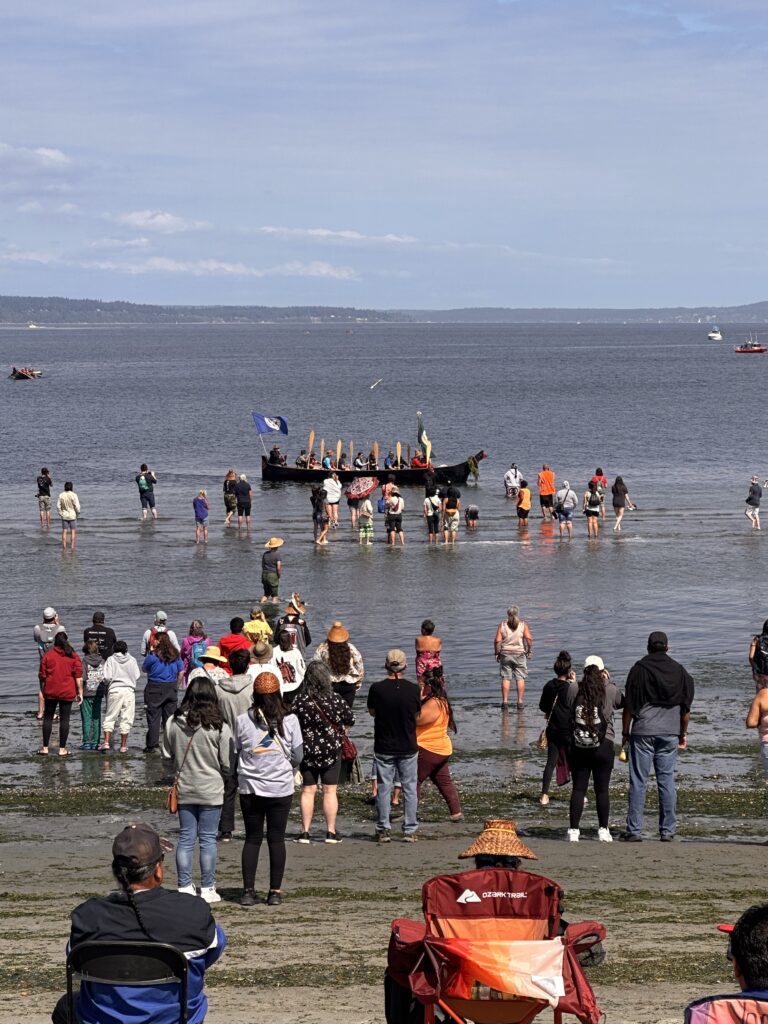
As the canoes came in, people on the shore waded into the water to greet them. (Credit: Lauren Gallup / NWPB)
Some from the beach waded into the water, closing the gap between them and other canoes as more and more canoe families paddled toward shore. The sounds of clapping, cheering and songs from shore and songs from canoes carried across the beach, as more canoes came in, more visitors waded in to greet them and the sun shone brighter as it rose high above the beach that afternoon.
Since 2019, there has been no such scene in the Pacific Northwest — COVID-19 and all its heartaches brought a stop to the annual canoe journey. A different tribe usually hosts each year, welcoming tribes from near and far to its homelands after the tribes make their way over ancestral highways in their canoes. The Muckleshoot have been waiting, and preparing, to host this year’s journey since they were chosen for the 2020 gathering — postponed until now.
As the canoes paddled in, the paddlers waited in the water in front of their hosts, with paddles raised as a sign of peace, and humbly asked permission of the tribe to come ashore. The Muckleshoot welcomed them to come, feast, rest and celebrate with them. Canoe families then brought their canoes to shore, lifting the heavy, long vessels, with only the strength of human hands up, above the sand where they gracefully laid them down.
Then, they danced.
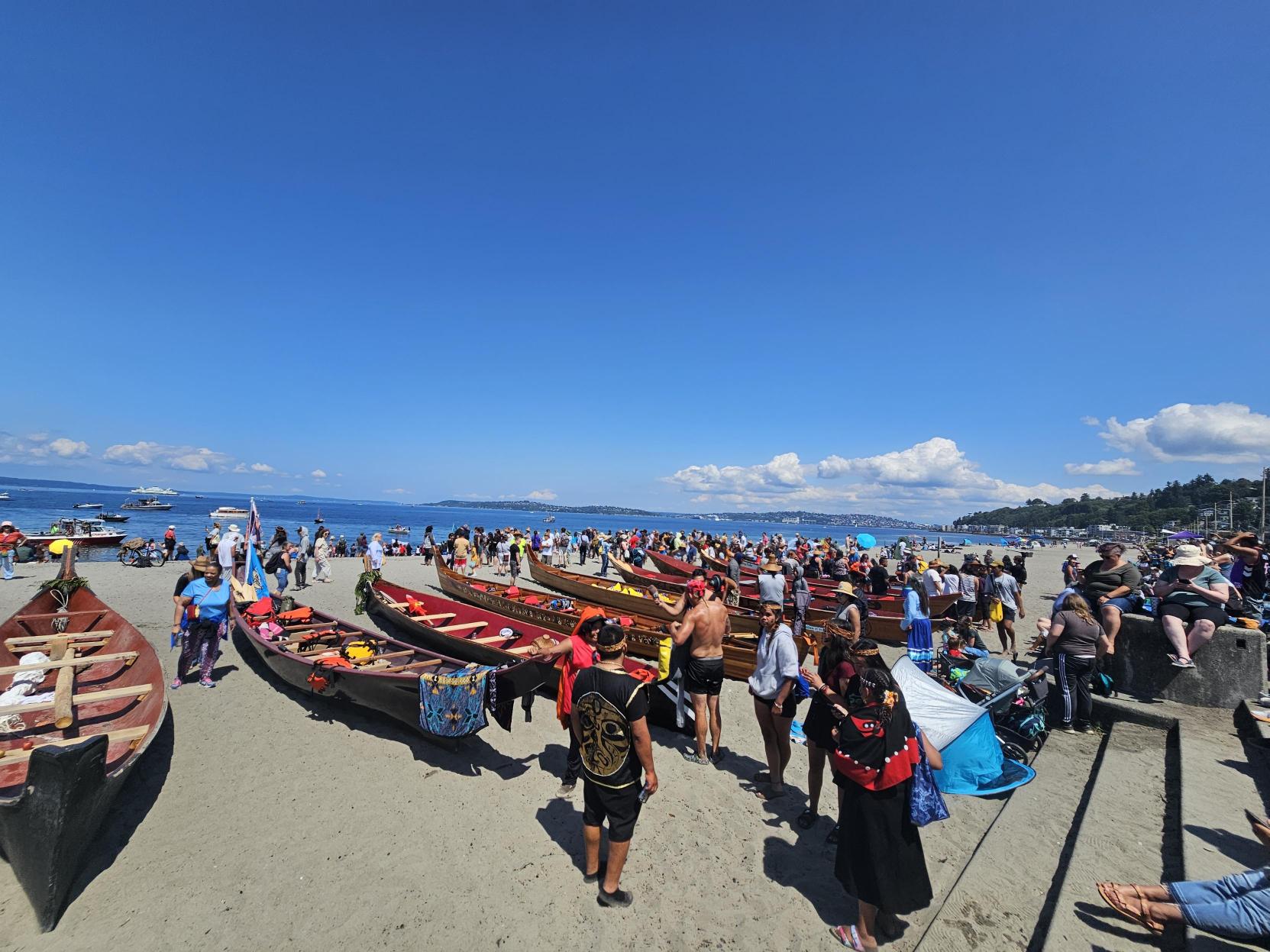
The canoes were brought up the sandy beach, where they laid safely as their passengers rested and ate in the hot sun. (Credit: Tracci Dial / NWPB)
(Runtime 3:56)
Drew Blaney and his canoe family poled onto Alki Beach after a long trip on the water through the Salish Sea .
“We’ve been on the water for about 11 days now,” Blaney said as he stood next to his beached canoe. “I can’t believe it. You know, it feels like we just left our shores.”
Blaney is from the Tla’amin Nation, located about five hours north of Vancouver, British Columbia, on the Sunshine Coast.
“When you get out on the water on those early days, the water is glass calm and you set up for your destination,” Blaney said. “All you can think about is your ancestors that have come before you that have done this for thousands of years.”
The journey takes tribes along ancestral highways within the Salish Sea and its tributaries. Blaney grew up hearing stories about his grandfather paddling in a dug-out canoe.
“I always wanted to be like that […] to get into our traditional canoes on our traditional highways,” Blaney said.
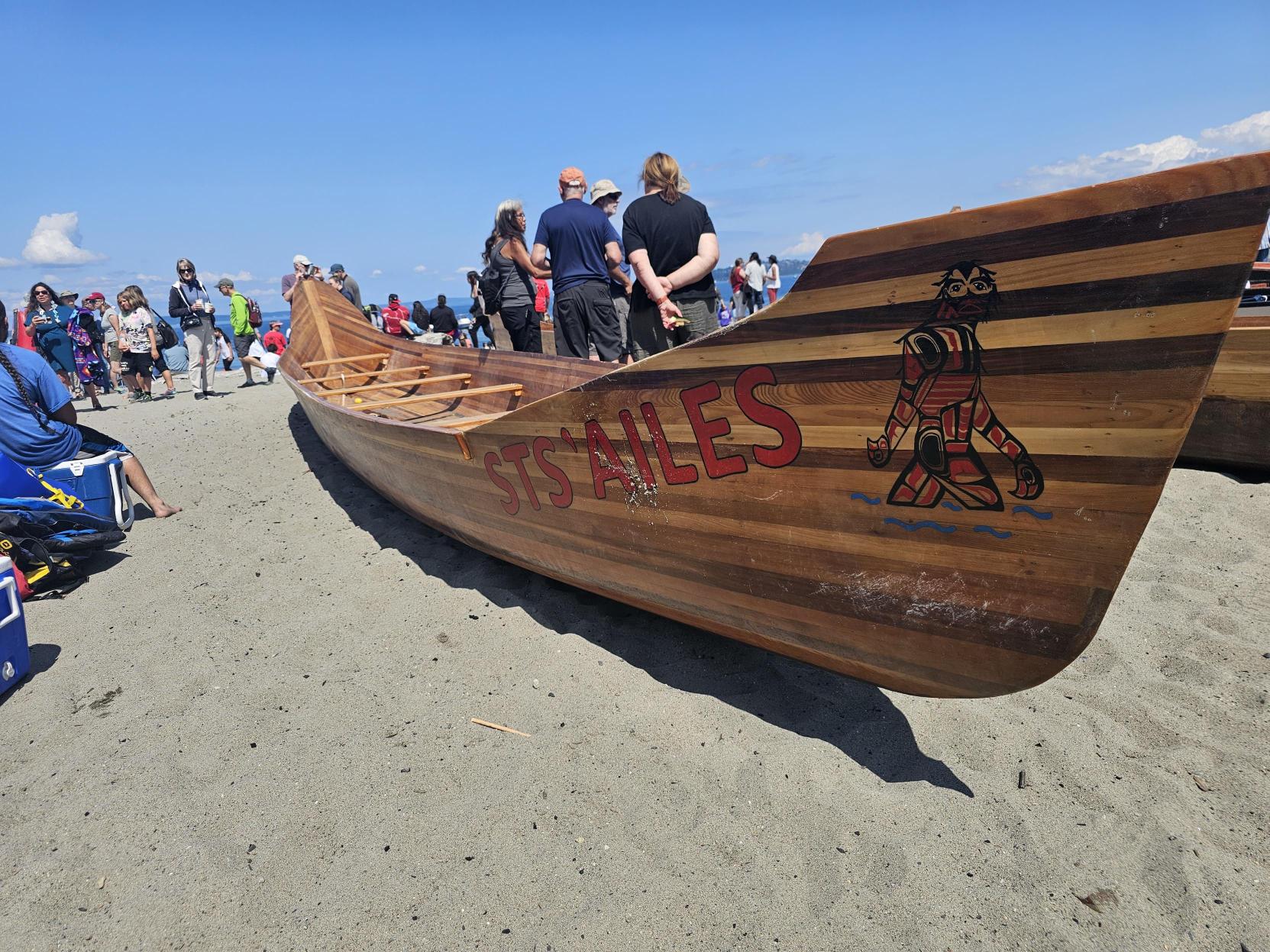
A Stt’ailes Nation canoe — the nation is located about five hours north of Vancouver, British Columbia. (Credit: Tracci Dial / NWPB)
Nancy Patricia “Pat” Charlie is an elder from the Sts’ailes Nation who poled alongside her children, grandchildren, nieces and nephews this year.
“This just makes my day to be able to do the paddle. I never thought I’d ever really do it,” Charlie said.
Charlie’s canoe traveled from Sts’ailes Nation lands in Canada, down the Fraser River, to Chillawack, Semihoo, Birch Bay and through to Lummi.
“It’s hard to describe the feeling. I felt emotional coming in and seeing all the people because it’s time for us,” Charlie said. “It’s time for us to celebrate who we are.”
For generations, Charlie said Indigenous people’s traditions and ways of life were suppressed through colonization. The songs, dance and drumming that mean so much to them were pushed down. Now, Charlie said, that’s changing.
“It’s time for our people — Indian people, Native people — to regain our rightful place that we have inherited,” Charlie said.
She was instrumental in making sure her people participated in the paddle. Relatives told her how powerful and spiritual taking part in the canoe journey is.
On the beach after the landing, Charlie said the sky is full of her ancestors. “They’re rejoicing because we’re finally becoming a whole person again, with our rightful place to have our singing and drumming,” Charlie said.
Muckleshoot hosts
(Runtime 3:58)
Modern canoe journeys started in 1989 with the Paddle to Seattle. In 2006, the Muckleshoot hosted the canoe journey; this year is their first time hosting since.
“I think it’s incredibly meaningful and powerful for us as tribal nations to be able to connect and come together and share this space, to have an exchange of culture, have an exchange of songs of dances, to bring our canoes together in a gathering like this,” said Donny Stevenson, vice chairman of the Muckleshoot Tribe.
Stevenson stood on shore at Alki in regalia for the day’s event, with pieces of carved and smoothed cedar adorning his black vest.
“Cedar is a fundamental resource for the people in this region,” Stevenson said. “We use it for virtually everything. We lived in it, we dressed in it, we rowed our canoes in it. It’s the paddles that we poled with. It’s a major part of who we are as a people.”
Alki Beach is significant for the Muckleshoot People.
“This is literally within the heart of our traditional homelands,” Stevenson said. “So our people, the Muckleshoot People, have been doing this exact thing at this exact location since time immemorial — our usual and accustomed lands exist from the shores of the Salish Sea here, all the way to the Cascade Range.”
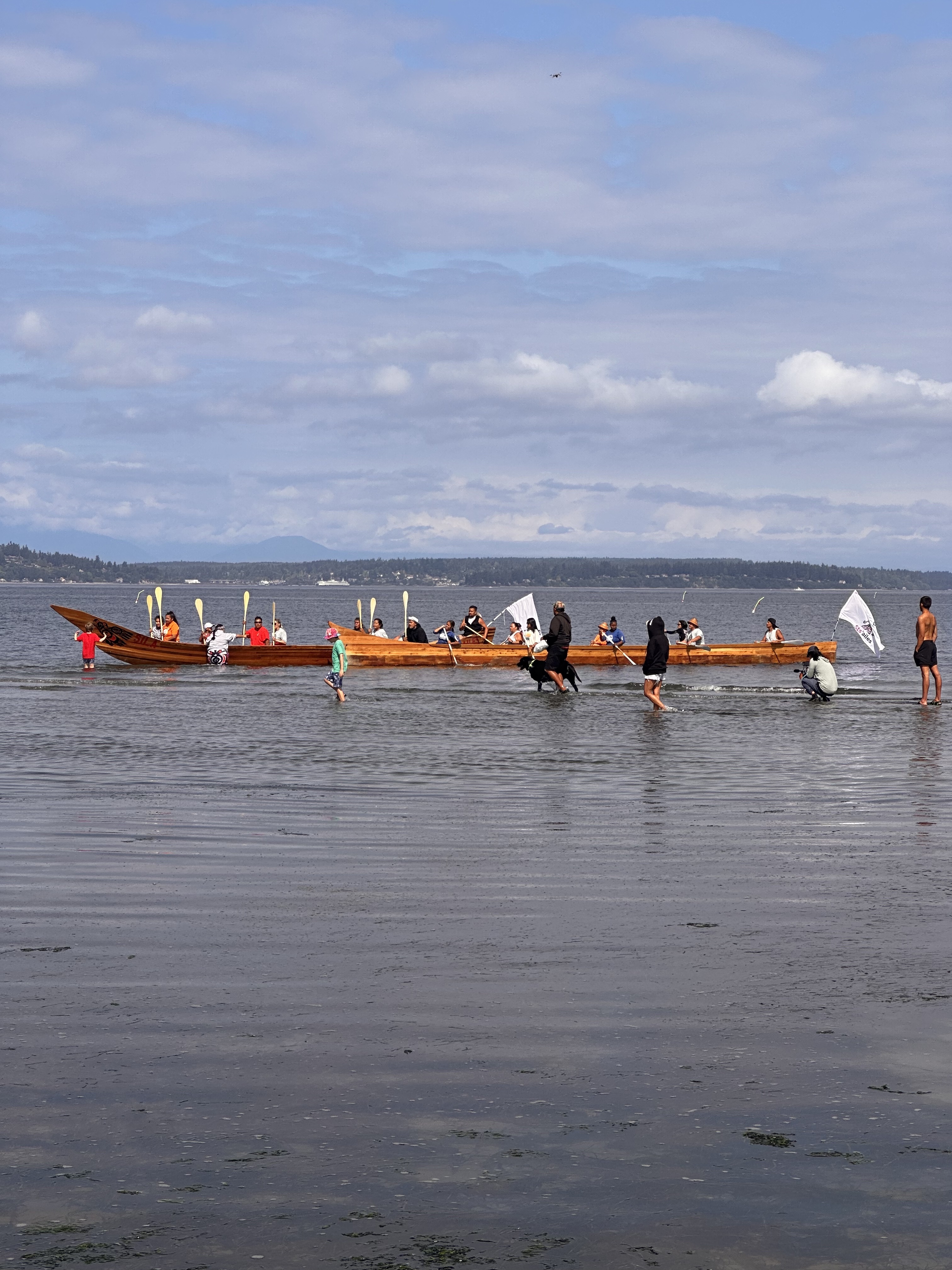
Canoes traveled along ancestral highways of the Salish Sea to arrive at Alki Beach Sunday, July 30. (Credit: Tracci Dial / NWPB)
Tribal members describe their time on the journey as medicine and healing. This year marks 10 years since Stevenson first took part.
“That was the first time I connected with my ancestors and our culture in a way that was so tangible,” Stevenson said. “It was such a part of my soul from that day forward. I don’t have to wonder if my ancestors were with me on that trip. I know they were.”
The reason tribes continue this tradition, Stevenson said, is to show the next generations both how to connect with their past and carry their ancestors’ legacy forward.
“That’s the goal that we, as tribal people, all have,” Stevenson said. “When you think of how hard our ancestors fought for everything we have today, people literally sacrificed and died for us to be here. So, that’s a profound responsibility.”
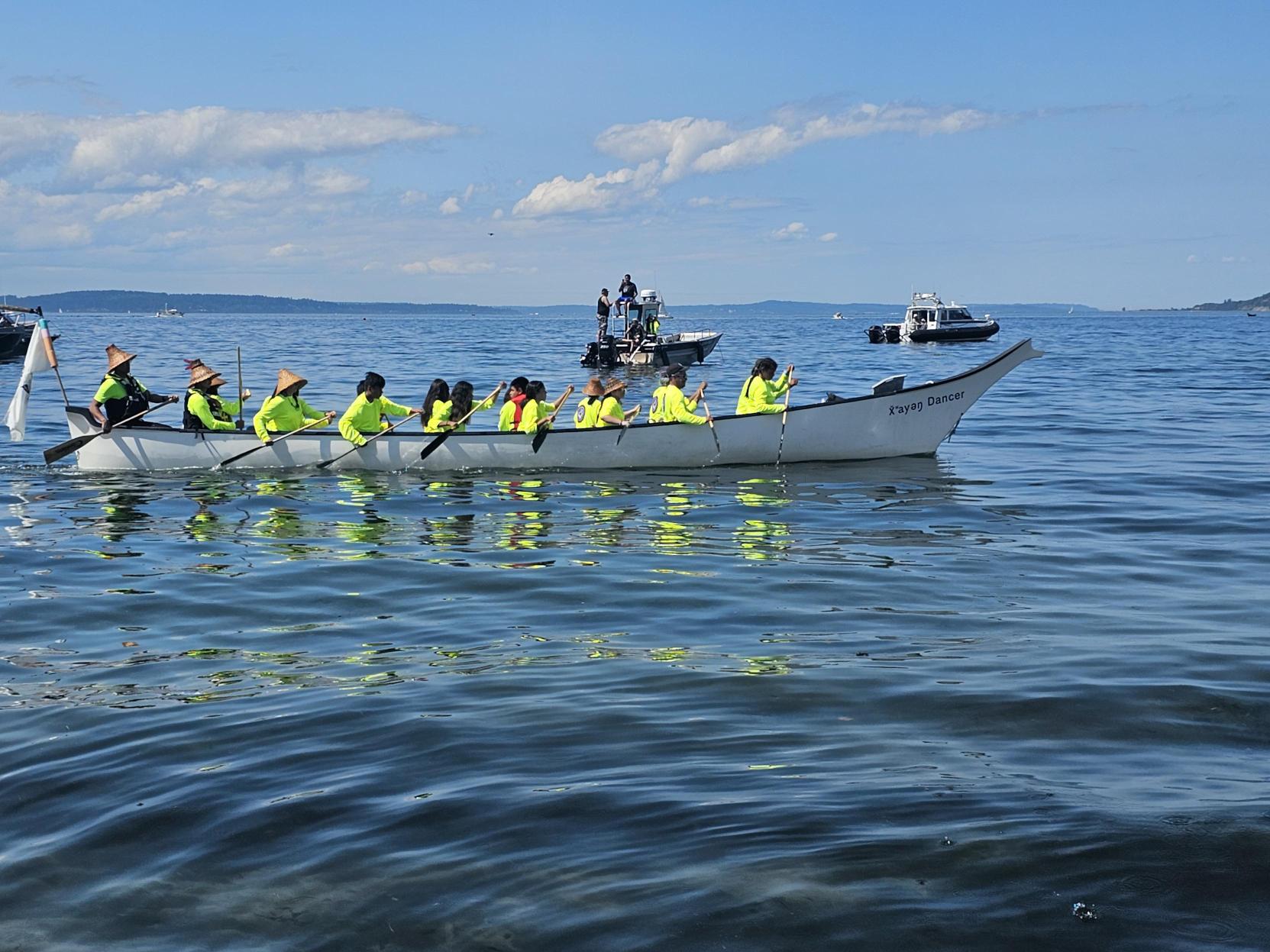
A canoe family paddles in to bring their canoe ashore and rest after a long journey. (Credit: Tracci Dial / NWPB)
Remembering those who came before
(Runtime 4:12)
One Muckleshoot canoe family remembered one of their own as they poled in this year’s journey.
Walter Pacheco, the tribe’s former culture liaison, died in July 2022.
Eileen Richardson poled in the canoe that Pacheco would have captained this year. She stood on Alki Beach after the landing, wearing a shirt with Pacheco’s face on it.
“Today for me and my family and the rest of Muckleshoot, we paddled in honor of him,” Richardson said.
Pacheco had been preparing for this year’s journey along with his tribe. After his passing, there were questions about how the canoe family, and tribe, would pull it off. But Richardson said they pulled together to honor Pacheco — and she said she is happy to see it come to fruition.
The 1989 Paddle to Seattle inspired Pacheco, said his son, Adrian Markantonatos. After that moment, Pacheco was central to bringing the Muckleshoot back to canoe journeys.
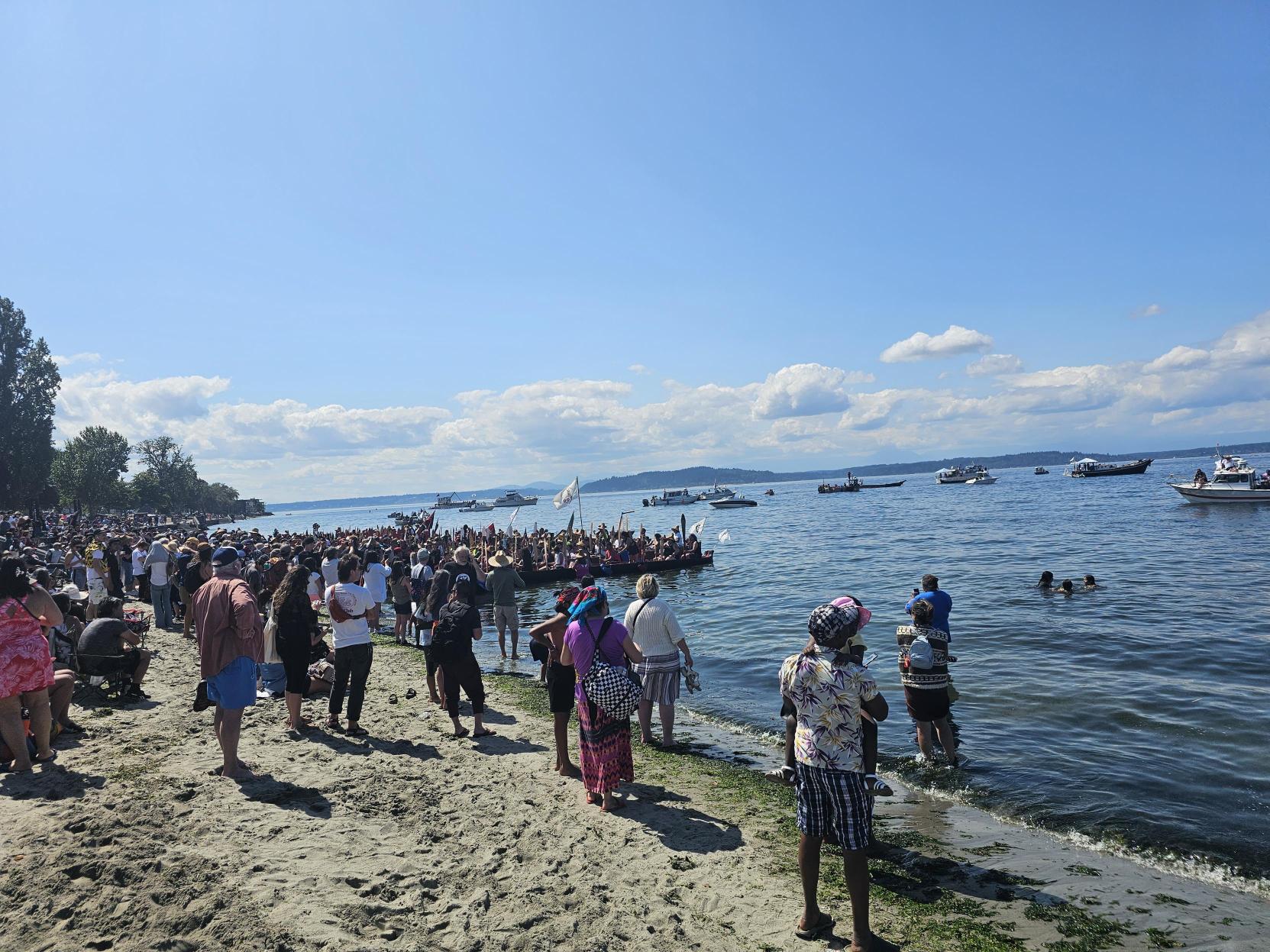
The 2023 canoe journey was long awaited after being postponed for three years because of the COVID-19 pandemic. (Credit: Tracci Dial / NWPB)
The Muckleshoot People first joined the canoe journey in 2002. Markantonatos remembers people practicing canoe songs at his father’s home.
“He was a very strong advocate to keep the culture alive and prominent in the Muckleshoot Tribe,” he said of his father.
Pacheco’s passing came unexpectedly and Markantonates said it was not only a loss for his family but the whole community.
Valerie Bellach is the coordinator of the tribe’s language program. She said Pacheco left a lasting impact on the tribe.
“Once you pick up that paddle and you put it in the water, you become part of a unit that moves together, and he taught us that. He taught us the significance of working together as a family,” Bellach said. “And I feel honored to carry on that work now in his memory.”
In honor of his father and out of a desire to dive into the culture his father helped keep thriving, Markantonatos poled for the first time in this year’s journey. Being on the water, Markantonatos said, all kinds of emotions can come up — surrounded by peaceful, serene beauty.
“When you’re out there and you’re poling and you’re giving it everything you got. Once you reach that destination, and you hear everybody cheering and war whooping … it’s just the most rewarding feeling,” Markantonatos said.
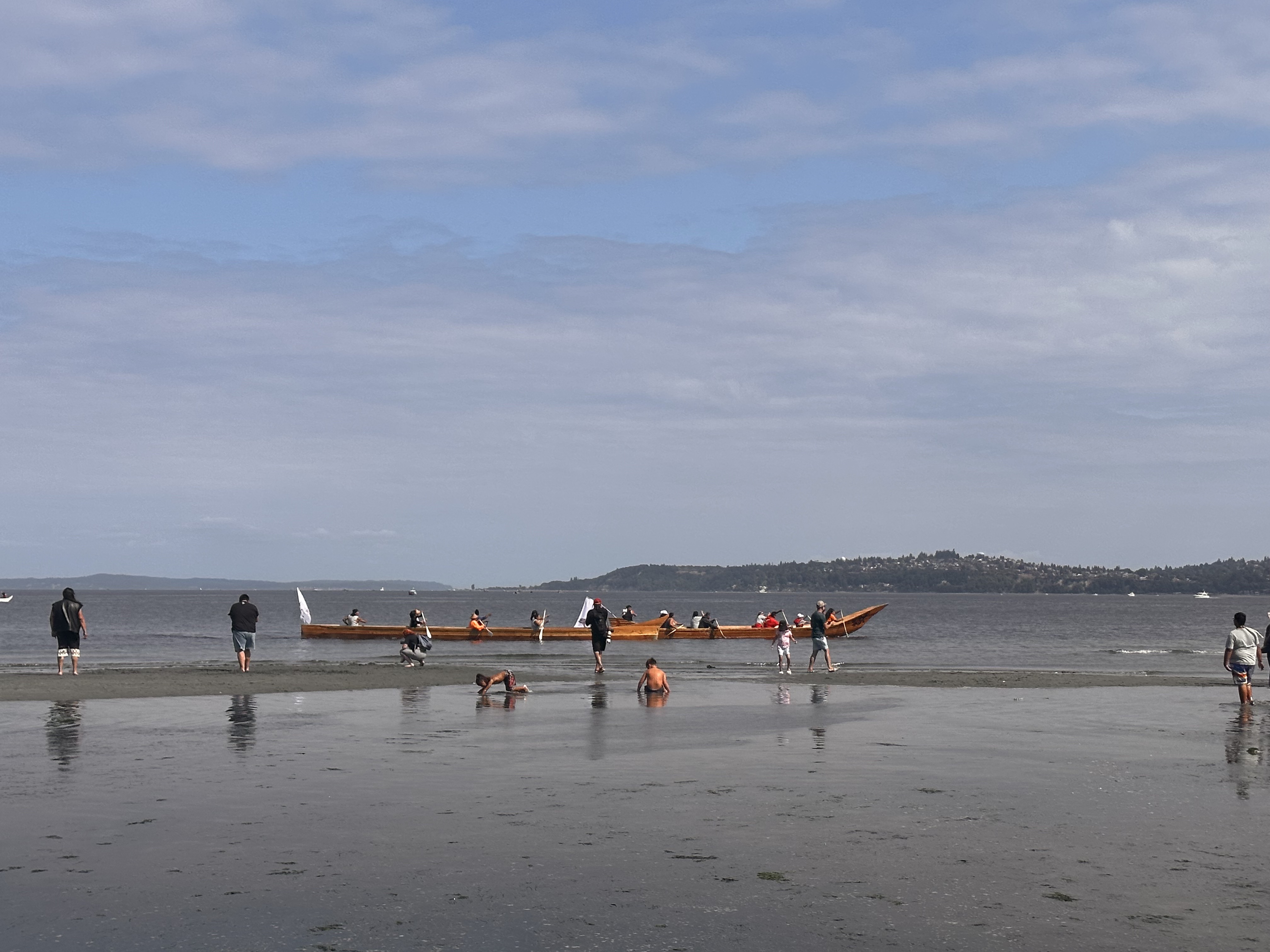
A moment of stillness and quiet as one canoe paddles in at Alki Beach. (Credit: Tracci Dial / NWPB)
Muckleshoot Tribal Chairman Jaison Elkins said the gathering is a show of strength.
“When you see at Alki Beach the other day, 10,000 plus people, happy and joyful, it shows that we’re still here, and we are thriving as a people, as the First People of these lands and waters,” Elkins said.
After landing, the canoe families traveled to the Muckleshoot Reservation. There they camped for a week, feasted together and shared traditional songs and dance. During the week-long celebration, each canoe family — each tribe — had a chance to do what’s called, “Protocol” where they take the floor to sing, dance, drum and honor their culture. This continued 24 hours a day, for the whole week.
“So we can continue to revitalize our culture and learn, learn from our people,” Elkins said. “It’s a display of unity. It’s a display of strength, and it’s a display of healing for our people.”







